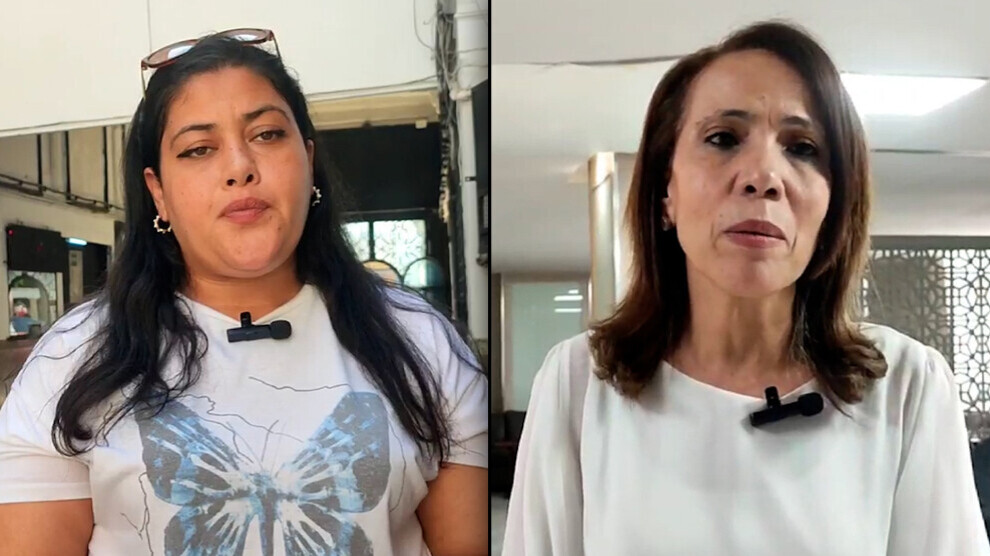Disabled Women’s Rights Are Overlooked in Tunisia
Basma Al-Soussi, who says that disabled women face discrimination in Tunisia, stated, 'The struggle of this group of women remains invisible, their rights are ignored, and they are subjected to violence.'

ZOUHOUR MECHERGUI
Tunisia – Since its independence, Tunisia has stood out as a country with legal regulations supporting women’s rights. The women’s movement has been fighting to secure and protect rights not just through symbolic slogans, but through legal frameworks that empower women. However, despite all these steps, existing laws do not fully protect women from violence, oppression, and exploitation. On the contrary, in some cases, violence against women is used as a form of retaliation against the legal rights that empower them. This approach is fueled by a patriarchal mindset that perceives demands for equality as a threat.
Representation of Disabled Women
Human rights activist Basma Al-Soussi highlighted that disabled women are still not adequately represented within Tunisia’s legal system. Although gains have long been achieved in the field of women’s rights, Basma Al-Soussi emphasized that disabled women have not benefited equally from these achievements and that existing laws ignore the needs of this group of women.
Basma Al-Soussi said, "The problems faced by disabled women are not only physical; there is also exclusion at legal, social, and economic levels. Legislation does not take the unique circumstances of these women into account. Therefore, even though disabled women have the same rights as other women, in practice they cannot benefit from these rights."
Violence Against Disabled Women Has Spread to All Areas of Life
Basma Al-Soussi, noting that Tunisia plays a pioneering role regionally in women’s rights but that this leadership is not sufficiently inclusive, regarded the absence of comprehensive data on disabled women as an indication of this exclusion. Basma Al-Soussi said, "Even in national statistics, the number of disabled women is not clearly reflected. They are invisible in economic, social, and political spheres. This causes them to lag behind in their struggle for rights."
Highlighting that the disregard for the privacy of disabled women in the media also constitutes a form of violence, Basma Al-Soussi continued:
"The struggle of disabled women remains invisible, their rights are ignored, and they are subjected to all forms of violence. However, this violence is not documented, and this group often does not know how to access information or dedicated reporting centers when they experience abuse. Moreover, they are not aware of the importance of documenting violence to follow up on perpetrators. Efforts related to women’s rights should not exclude any woman, especially those with different needs. In processes of preserving women’s memory and documenting their struggles, disabled women are often ignored. Yet, this memory must include all of us. We must create a holistic social memory that encompasses all women, free from discrimination."
Ongoing Threats to Women’s Rights
Many disabled women in Tunisia have created a genuine revolution in the fight for the rights of this group. However, they are not recognized, no one talks about them, and they are excluded. Where are the rights of disabled women in the programs and projects carried out by the government and civil society? This directs us to improve infrastructure, mindset, and education, to revise curricula, and to present disabled women in society in a strong and clear manner. In this way, people will get used to the fact that disabled women are part of a larger social structure that cannot be achieved without inclusion. Empowerment can only be achieved through a long-term and inclusive process.
Marwa Al-Qassimi from the Ya Horra Association emphasized that women’s rights remain under serious threat, whether disabled or not. Despite laws enacted to protect women, their effective implementation is lacking. Marwa Al-Qassimi stated that this is due to systematic incitement campaigns against women and insufficient steps toward changing societal mindsets. She highlighted that narratives suggesting women usurp rights and threaten men’s existence are being widely spread. She described the use of digital media and other media to undermine women’s rights and distort their struggles as an unprecedented and concerning situation. Marwa Al-Qassimi noted that many political parties in Tunisia attempt to spread the perception that the family institution is under threat due to the feminist movement, which also targets women’s achievements.
The Issue Isn’t the Laws It’s Making Women’s Rights Visible and Standing Against Violence
Marwa Al-Qassimi stated, “True freedom for women begins with the recognition of their rights as human beings, rights that are guaranteed by the constitution.” She emphasized that these rights were won through women’s long-standing struggle and can only be protected through the laws that were enacted as a result of this struggle. Highlighting the importance of respecting women’s differences and diversity, Marwa Al-Qassimi said that this is fundamental not only for superficial rights but for a deeper and more inclusive understanding of freedom. She also condemned misinformation campaigns targeting families and women, noting that some extremist groups demand amendments to the Personal Status Code, depriving women of child support in cases of divorce, and spreading narratives that women use marriage solely for financial gain—posing serious threats to women’s social and physical safety.
Marwa Al-Qassimi stressed that Tunisia possesses revolutionary laws on women’s rights and that the country is a pioneer not only regionally but also globally. She pointed out that Tunisia has served as an example even for Western countries in the enactment of progressive laws in favor of women, citing the 1965 law allowing safe abortion and Law No. 58 of 2017, aimed at combating all forms of violence against women, as evidence of Tunisia’s determination. Marwa Al-Qassimi added, “Tunisia has included complex issues such as political violence in its legislation, placing it ahead of many African and Middle Eastern countries. However, in my view, the real problem is not in making laws. The issue lies in the patriarchal mindset underlying violence, oppression, and exploitation of women. This mindset does not respect women and even takes pleasure in the suffering we endure.”
